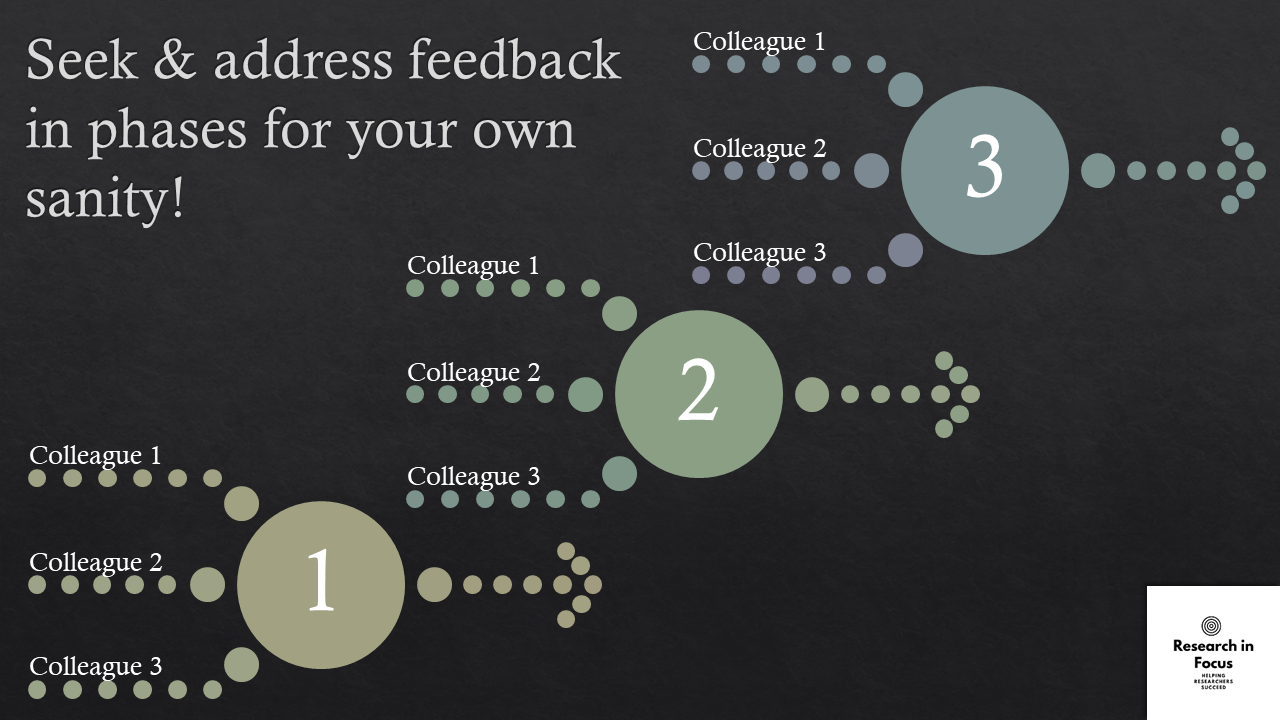Making the most of pre-grant submission colleague feedback

There comes a point in most grant application journeys where it is super east to become overwhelmed, and where either the law of diminishing returns arrives, or you risk going backwards in terms of the strength of the case for funding you have enunciated.
That part is usually towards the end, so here are some tips to optimise the process:
1) When you share your draft proposal with your colleague/s give them a copy of the assessment criteria! Most colleagues are caring and want to support you but they are also busy people and when handed a draft proposal may not think to double check the assessment criteria and therefore they will tell you what their immediate reaction is, rather than adopting the mindset they would if they were a reviewer for the actual scheme. Maybe they know the scheme you are applying too well and you'll get useful input, maybe it has evolved since they were last aware of the scheme objectives, or maybe they don't know, but think they do! Either way, help them to help you; give them a copy of the assessment criteria, don't make them go searching!
2) Another way to help colleagues to give you the most useful feedback that they can is to ask them a set of specific questions. Perhaps in addition to the assessment criteria you could ask them how specific sections of the proposal could be improved, or whether the way you have described something is as clear and compelling as it can be. Prioritise your questions in areas that you know are important in terms of the assessment process, but that your self review/intuition suggests are weaker than you'd like.
3) Purely negative feedback can be counter productive. Yes it is important to address any weaknesses, and yes we should embrace our growth edges, by not shying away from elements that aren't as good yet as they could be. But the risk of only negative feedback is that mistakenly edit out areas of strengths. try using a balanced feedback framework such as the Positives, Potentials and Concerns (PPC) framework, which you can download a template for from the RiF inner circle (FREE). This will allow colleagues to reinforce your thoughts/surprise you with areas that are already strong and therefore a) need to be kept, and b) don't need to occupy any more of your limited time/effort.
4) Lastly, for your own wellbeing please, please, please gather feedback in phases! Grant applications are NOT an exact science, they are a craft form. Therefore, very quickly feedback takes on the form of personal opinion, which may, or may not be consistent across those giving you feedback. Under NO circumstances should you seek feedback in incremental steps. Take a range of opinion, thank each supporter for the significant time and effort they have invested in you and then decide for yourself what feedback you will address, and which you will not. YOU must exercise self leadership. Read and reflect on all the feedback, take on board everything that is common, ponder the rest, then decide. The parameters you might use to decide include: what YOUR vision for the project and intuition is telling you is right for this application, how familiar the person giving you feedback is with the scheme you are applying too, and the research area in general, and what fits well in terms of the rest of the application to ensure you are presenting a compelling and well argued case.
Colleague input can be really useful. Don't wait too long before bravely sharing early drafts, particularly if you are an ECR. Experienced colleague input can be incredibly supportive at the early stage, but if your plans have become too concrete it can be difficult intellectually to ponder and take on board their suggestions for strengthening.
If you need an objective critical friend, we're here when you need us. Check out this page to see how we can help.
Good luck!


